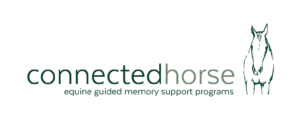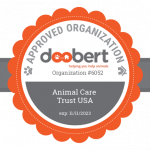 Recently, on All My Children Wear Fur Coats, Peggy Hoyt chatted with Nancy Schier-Anzelmo and Paula Hertel who highlighted the unique relationship between people and horses and explained how Connected Horse supports individuals with dementia and their care partners.
Recently, on All My Children Wear Fur Coats, Peggy Hoyt chatted with Nancy Schier-Anzelmo and Paula Hertel who highlighted the unique relationship between people and horses and explained how Connected Horse supports individuals with dementia and their care partners.
Nancy Schier-Anzelmo and Paula Hertel are the founders of Connect Horse, a non-profit organization that provides equine-assisted learning workshops to individuals impacted by dementia. Nancy and Paula, experts in aging and elder care, grew frustrated by the shortage of non-pharmacological treatments for dementia, despite the rising number of diagnoses. As avid equestrians, the duo was aware of the healing power of horses. Given the success of horses in therapeutic applications for veterans, prisoners, and other groups, they speculated that horses might also benefit individuals affected by dementia. By measuring well-being outcomes, they observed notable improvements in participants’ depression, anxiety, social connection, and sleep. Additional research at UC Davis and Stanford further validated the effectiveness of the Connected Horse Program.
Paula emphasized the program’s focus on lifestyle, relationships, and mindfulness. Based on the Social Prescribing Movement, Connected Horse fosters connectivity by instilling confidence and determination in participants and empowering them to focus on the present moment. Rather than depending on medications, the program advocates for exercise and time spent outdoors. It is designed to enhance the lives of both individuals with dementia and the individuals who care for them; their care partners. Nancy stated that the program aims to destigmatize dementia diagnoses by promoting acceptance and implementing a non-judgmental, full-person approach.
Nancy explained why horses are exceptionally suited for therapeutic applications. She asserted that horses are prey animals that are highly attuned to their environment. Their intuitive nature prompts participants to be mindful of the energy they project, while their adeptness at nonverbal communication fosters deeper social connections. Paula added that the bond between horses and humans is so profound that even those with limited experience often form strong emotional memories and a deep respect for horses.
Paula discussed the safety protocols that Connected Horse employs to protect both horses and participants. Facilitators undergo thorough training to ensure participant safety. Horse handlers, whose role is to observe and advocate for the wellbeing of horses, are present at each session. Horses are continually evaluated to make sure they are content and willing to participate. Additionally, Nancy and Paula carefully consider logistical factors including a farm’s physical layout.
Paula described Connected Horse’s plans for the future. She noted that they aim to train new facilitators to increase the program’s reach. For individuals who are unable to attend workshops in California or Nevada, Connected Horse has developed a sensory engagement kit that mimics the tactile experiences at the barn. Nancy and Paula have a goal to expand their program for widespread accessibility and hope that, one day, doctors will prescribe visits to the farm.
To learn more about Connected Horse, to learn more about becoming a facilitator or to apply to become a volunteer, visit ConnectedHorse.org. Follow Connected Horse on Facebook at Facebook.com/ConnectedHorse.org.
Don’t forget to protect your beloved pet with a Pet Trust! Learn more at ACT4Pets.org!


